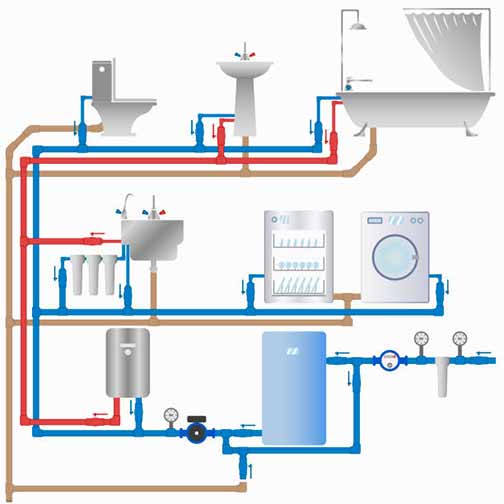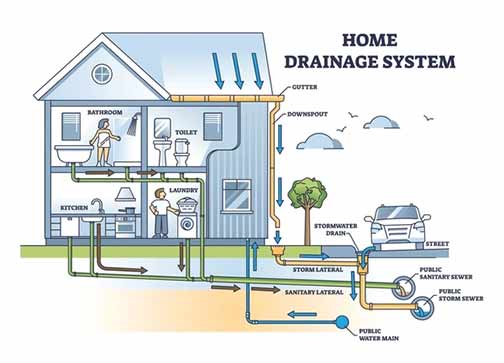
Understanding the intricacies of home plumbing systems is essential for homeowners and professionals alike. Plumbing systems are the backbone of modern living, providing the necessary infrastructure for water supply and waste management. A professional approach to understanding these systems not only equips individuals with practical knowledge but also empowers them to address common plumbing issues effectively. Here we aim to deliver a comprehensive and assertive yet inclusive look at the vital components, common issues, and maintenance practices associated with residential plumbing systems.
Components of Residential Plumbing: A Detailed Examination
Residential plumbing comprises various components that work together to ensure efficient water distribution and waste disposal. These components include pipes, fixtures, valves, drains, and water heaters. Each part plays a critical role in maintaining the functionality and efficiency of the plumbing system. Understanding these components is crucial for anyone looking to manage their home plumbing system effectively.
Pipes: The Circulatory System of Home Plumbing
Pipes are the conduits through which water flows throughout a home. They come in various materials, such as copper, PVC, and PEX, each with its advantages and applications. Copper pipes are known for their durability and resistance to corrosion, making them a popular choice for many homeowners. PVC pipes are lightweight and easy to install, making them ideal for certain applications. PEX pipes offer flexibility and are resistant to scale and chlorine, making them suitable for both hot and cold water applications. Understanding the types of pipes used in residential plumbing is crucial for selecting the appropriate material for repairs or installations.
Fixtures: Essential Elements of Plumbing Systems
Fixtures are the visible components of plumbing systems that facilitate water usage, such as faucets, showers, toilets, and sinks. Proper installation and maintenance of fixtures are vital to prevent leaks and ensure efficient water usage. Familiarity with different fixture types and their functionalities can aid in troubleshooting common issues. For example, knowing how to replace a washer in a leaky faucet or understanding the workings of a dual-flush toilet can save both water and money.
Valves: Controlling Water Flow with Precision
Valves are integral to regulating water pressure and flow within plumbing systems. They allow homeowners to control the water supply to various parts of the home, enabling maintenance and repairs without disrupting the entire system. Understanding valve types, such as gate valves, ball valves, and check valves, and their applications is essential for effective plumbing management. Each type of valve serves a specific purpose, and knowing when and where to use them can prevent potential plumbing issues.

Drains: Ensuring Efficient Waste Disposal
Drains are responsible for removing wastewater from the home, preventing accumulation and potential health hazards. Proper drain installation and maintenance are crucial to avoid blockages and ensure smooth waste disposal. Knowledge of drain systems and their components, such as traps, vents, and cleanouts, can help address common drainage issues. Regular cleaning and inspection of drains can prevent clogs and backups, ensuring a hygienic and functional plumbing system.
Water Heaters: Ensuring a Consistent Hot Water Supply
Water heaters are essential for providing hot water for various household activities, such as bathing, cooking, and cleaning. Different types of water heaters, including tankless and storage models, offer varying benefits and efficiencies. Understanding the operation and maintenance of water heaters is vital for ensuring a consistent hot water supply. Regular maintenance, such as flushing the tank to remove sediment buildup and inspecting the anode rod, can prolong the life of a water heater and improve its efficiency.
Common Plumbing Issues and Solutions: A Professional Guide
Homeowners often encounter plumbing issues, ranging from minor leaks to significant system failures. Common problems include clogged drains, leaking faucets, and low water pressure. A professional understanding of plumbing systems aids in diagnosing and resolving these issues promptly, minimizing damage and repair costs.
For instance, using a plunger or a plumber’s snake can often clear a clogged drain, while replacing worn-out washers can stop a leaking faucet. Understanding the root causes of these issues can prevent them from recurring.
Preventive Maintenance for Plumbing Systems: A Proactive Approach
Regular maintenance of plumbing systems is crucial for preventing major issues and extending the lifespan of components. Simple practices, such as inspecting pipes for leaks, cleaning drains, and checking water heater efficiency, can significantly reduce the risk of costly repairs. Preventive maintenance not only ensures the smooth operation of plumbing systems but also contributes to water conservation and energy efficiency, benefiting both the environment and the homeowner’s wallet.
Professional Plumbing Services: When to Seek Expert Assistance
While homeowners can address minor plumbing issues, a licensed plumber is essential for complex repairs and installations. Professional plumbers possess the expertise and tools necessary to ensure safe and efficient plumbing operations. Understanding when to seek professional assistance is vital for maintaining the integrity of home plumbing systems. For example, tasks such as replacing a main water line or installing a new water heater should be left to professionals to ensure compliance with local codes and standards.
Conclusion: Empowering Homeowners with Plumbing Knowledge
A professional approach to understanding home plumbing equips individuals with the knowledge needed to manage their systems effectively. By familiarizing themselves with the components, common issues, and maintenance practices, homeowners can ensure the longevity and efficiency of their plumbing systems, ultimately enhancing their living environment.
This comprehensive understanding not only empowers homeowners to tackle minor issues themselves but also enables them to make informed decisions when hiring a plumber, ensuring a safe, efficient, and reliable plumbing system for years to come.

